Best Android browser: 8 compared for speed and features
The best Android browsers face-off
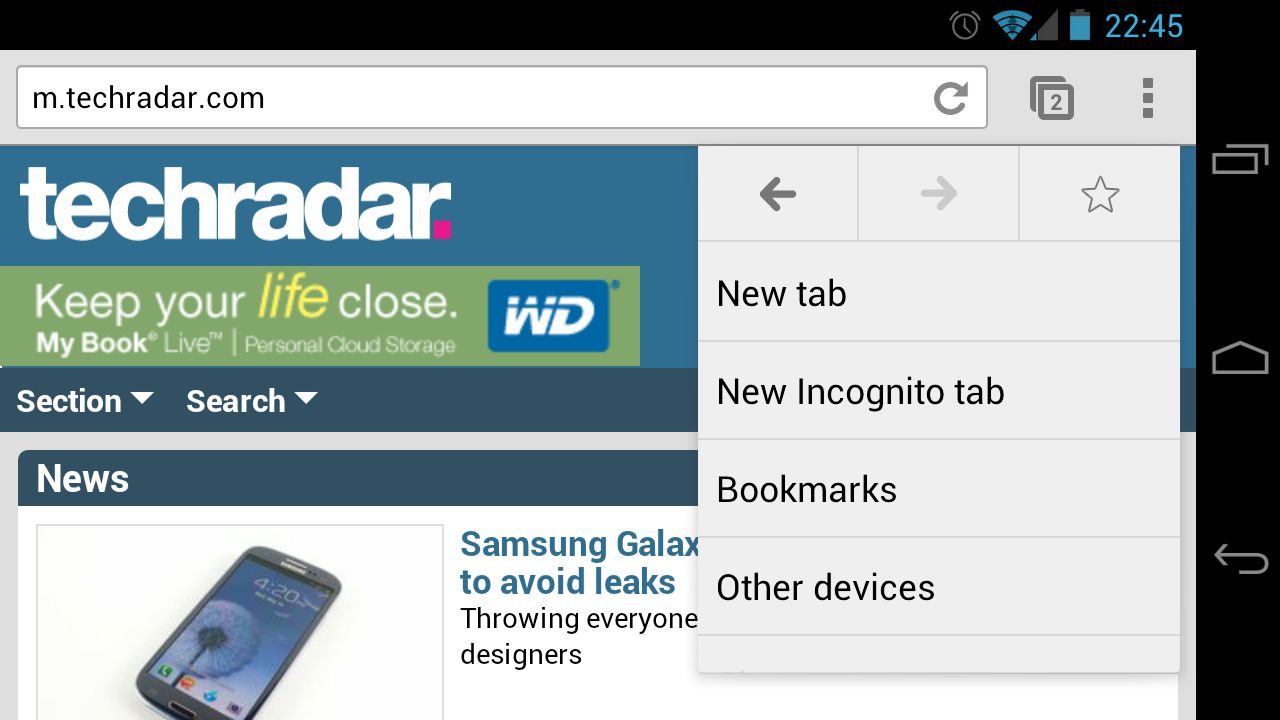
Sign up for breaking news, reviews, opinion, top tech deals, and more.
You are now subscribed
Your newsletter sign-up was successful
We wouldn't recommend sticking with Internet Explorer on a PC unless you've tried out some of the alternatives, and in the same way you're doing yourself no favours if you've never ventured beyond the stock Android browser for getting around the web.
There are a growing number of top-quality alternative browsers out there, recently joined by a stylish new beta edition of Firefox, and we've detailed eight of our favourites below.
As on Windows, these browsers will be keen to take responsibility for opening up links for you, but there's no harm in running them alongside each other. To clear the default browser, visit the incumbent program's page in the Apps page in Settings, then hit "Clear defaults". The next time a link is opened, you'll be given a choice of all the browsers installed on your device.
1. Android browser
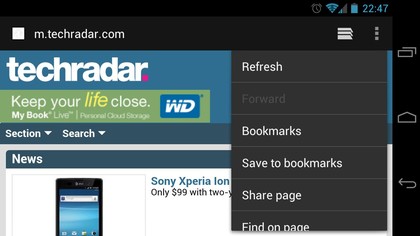
Let's cover the stock browser first for comparison purposes, as it certainly has its merits. It provides the foundations from which Chrome Beta was born with its ability to sync some data (such as bookmarks) from the desktop Chrome browser. In terms of its looks it's strictly functional and ordinary, but it renders pages quickly, lets you take control over the cookies and other data that each site can log, and despite a lack of stand-out features gets the job done with the minimum of fuss. There's an option to save pages, should you be planning a long period offline.
Average site load speed: 8.25 seconds.
2. Chrome Beta
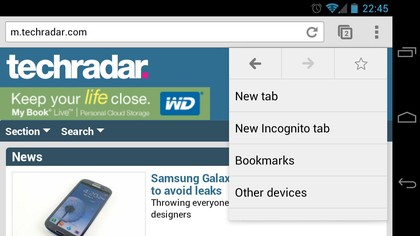
If you're one of the privileged few running Ice Cream Sandwich, then you can give the beta version of Chrome a whirl. Like its desktop counterpart, it's fast across the ground and handles tabs in a very intuitive way, as well as including some nice gradients and animations. You can sync open tabs, passwords and other data between desktop Chrome and mobile Chrome if you'd like to, and the new tab page gives you a choice between your most visited sites and your bookmarks. As with the stock browser, there's a switch to view mobile-optimised sites in full desktop mode, should you want to pretend you're on a PC.
Average site load speed: 6.98 seconds
Sign up for breaking news, reviews, opinion, top tech deals, and more.
3. Dolphin Browser HD

Dolphin Browser HD has just about every mobile browser feature you can think of, as you'll see when you launch it -- you can set Flash on, off or on-demand, and have your phone emulate a desktop PC, iPhone or iPad, and that's just on the first screen. It has powerful gesture-control features, multi-touch zoom, and voice input via the Sonar plug-in -- in fact the variety of available plug-ins is one of Dolphin's most appealing features. It can seem like too much for simple browsing tasks, but in terms of comprehensiveness and feature-set it's very hard to beat.
Average site load speed: 8.36 seconds
4. Firefox beta
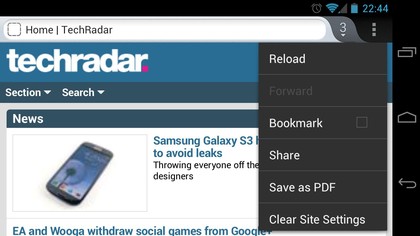
The new beta version of Firefox for Android brings with it a smooth browsing experience, a stylish-looking interface and tab management system, and a selection of add-ons (as you would expect from the Firefox brand). We noticed the occasional glitch but that's not unusual for a beta product, and loading times were quick enough, while complicated sites were handled robustly -- though it took longer to load full websites, it handled plug-ins and complex layouts better general speaking, and mobile sites loaded in a snap. As with Chrome, you can sync settings and other content with desktop installations of the browser.
Average site load speed: 10.72 seconds
5. Opera Mobile
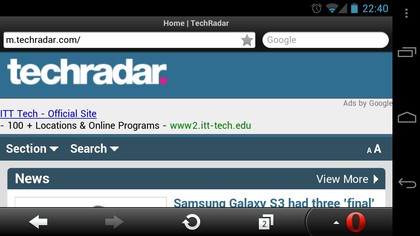
Opera's been playing the mobile browser game for a long time, and it shows in the intuitive interface, intelligent rendering and zoom controls and handy start page available in Opera Mobile. Notable features include the ability to hide parts of the interface, a one-column mode that attempts to optimise sites that aren't mobile-friendly, and the server-side Opera Turbo compression system. As with Chrome and Firefox, you can sync various settings with the desktop version of Opera.
Average site load time: 8.13 seconds
6. Ninesky
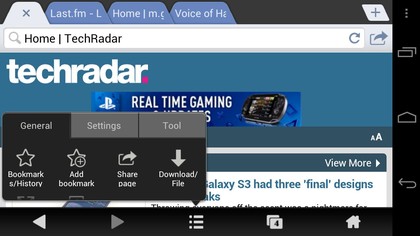
Ninesky comes with some useful ideas, such as a night mode to ease the strain on your eyes in bed, and an automatic mobile optimiser that strips down a site to its bare text-and-image essentials -- it works better on some sites than others, though it's very handy when you have a weak mobile signal and just want to get at the football scores. The interface is fairly straightforward and there are plenty of privacy settings to play around with, and the tabs disappear when they're not needed to give you more screen space.
Average site loading time: 7.85 seconds
7. Skyfire

A lot of thought about the mobile experience has gone into Skyfire -- there's a big Facebook Like button, for example, that saves you having to hunt around on the page for a tiny icon, and a server-side Flash-to-HTML5 converter that improves video playback (though this is a paid-for add-on). It vies with Dolphin HD for the sheer number of options and features that have been crammed in, though the look and feel does suffer somewhat as a result. Certainly the most innovative and idea-packed browser we tested.
Average site loading time: 7.60 seconds
8. Boat Browser
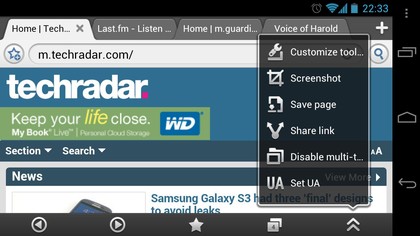
Boat Browser mostly sticks to the basics, but it does them well, and there are a number of handy utilities hidden away if you delve into the menus. The interface and settings pages are clean and easy to use, and the unobtrusive pop-up menu can be customised to show only the options you'd like to have available. You can switch the browser's User Agent tag in a couple of taps, and other welcome functions include a screenshot tool, private browsing capabilities, voice input and a night mode.
Average site loading time: 8.54 seconds
Speed test notes: with a cleared cache and no apps running in the background, each browser was asked to launch four different sites, two with minimal mobile content and two unoptimised full sites, over Wi-Fi. The time from sending the URL to the page being fully loaded was recorded and then averaged out over the four sites. Though not a particularly scientific test, it does give a general idea of rendering performance and speed.

Dave is a freelance tech journalist who has been writing about gadgets, apps and the web for more than two decades. Based out of Stockport, England, on TechRadar you'll find him covering news, features and reviews, particularly for phones, tablets and wearables. Working to ensure our breaking news coverage is the best in the business over weekends, David also has bylines at Gizmodo, T3, PopSci and a few other places besides, as well as being many years editing the likes of PC Explorer and The Hardware Handbook.